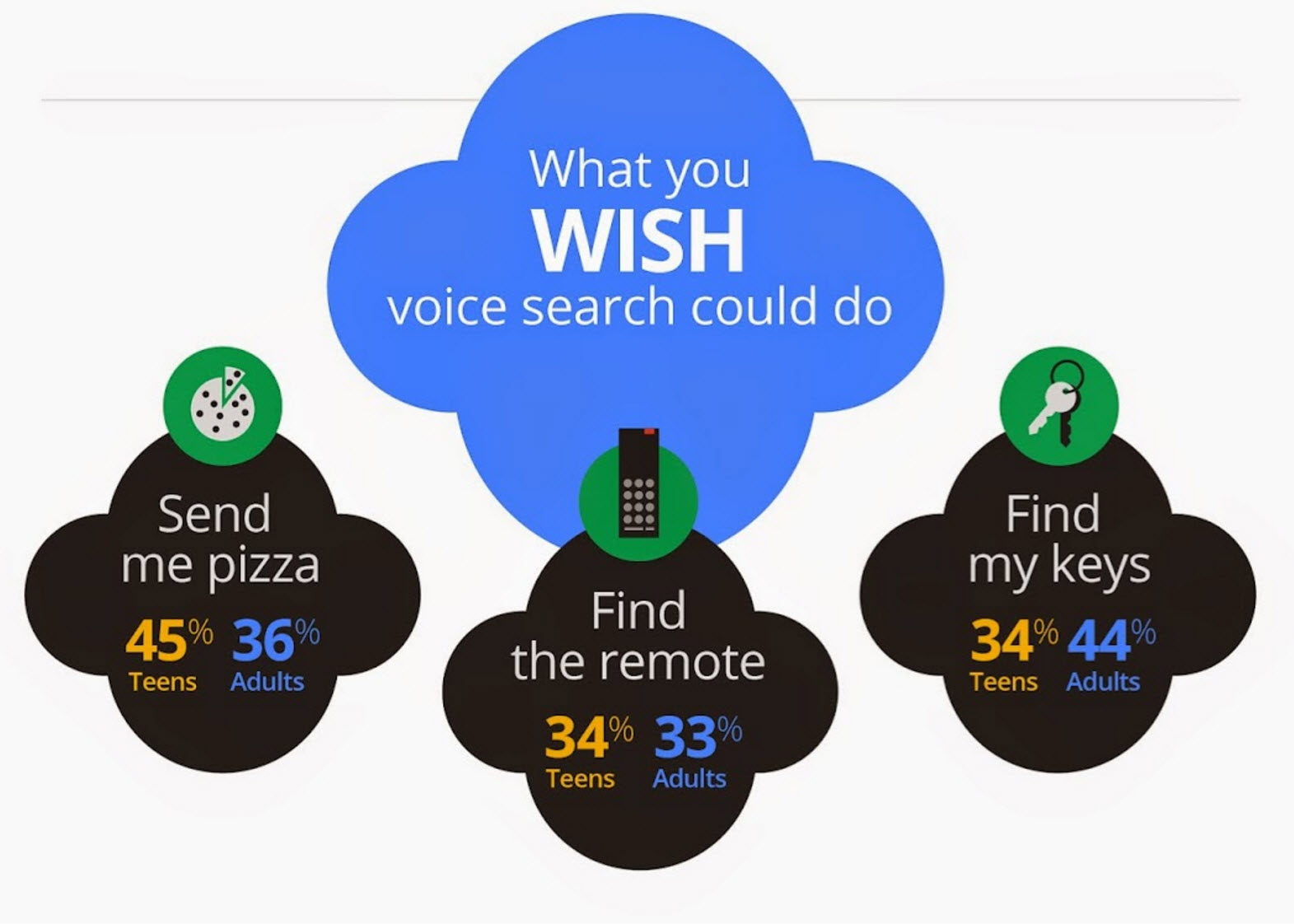Today’s voice search is barely even the interface and it’s certainly not the result
The interesting problem we have with voice search today is in the execution. It’s triggered with an “OK Google”, the audio from your voice is recorded and sent via Voice Recognition API to be converted to text. That text is then returned to the device to trigger the search. It’s not all that different to just typing the query yourself.
Voice search is an alternative way to enter what would be typed or tapped queries. The queries themselves may be starting to evolve towards the long tail, but on the whole we’re still talking informational search queries. They haven’t changed drastically from typed queries.
Probably the best use of Voice today. (In my humble opinion):
“OK Google; play music by the White Stripes.”

Though most queries still can’t be answered without a physical interaction:
“OK Google, how do I install a Gas Cylinder for a Weber BBQ?”

From here you have to tap a video or organic search result listing. Today’s Voice Search is lame.
Despite this lack of flow, Google says 20 percent of mobile queries are voice searches.
I’m struggling to believe that statistic. Still, there are some early signs of brilliance. I like being able to get my phone to play the music I want, especially when it plays through Bluetooth in my car. But, for many other queries, you don’t get an appropriate result.
Voice Search yields web page results, not Voice results. Unless Wikipedia ranks or there’s a particular type of answer box. There’s no “voice index”, which makes providing a meaningful vocal response rather difficult. Google must recognise they have this problem.
An even bigger problem is their own studies seem to highlight the limited understanding that consumers have of what’s possible:

Teens use Voice Search more and have a stronger desire for more types of action to be possible, but hardly seem to be thinking “big”. Source: Google.
Let’s get through this uncomfortable teething period and think about the way we’ll use voice search tomorrow. It looks like Voice search in the future will be the gateway to UI, daily utility and complex problem solving. That’s really interesting, but this time is still some way off.
The real voice search revolution is still waiting to happen
Amazon Echo is an exciting proposition indeed (powered by the voice service API Alexa). Google are soon to launch Home, and Apple are rumoured to be working on their answer via an updated version of Apple TV.
2 out of 3 of the products I just suggested don’t exist yet, Amazon Echo isn’t available in the UK and has only sold 3m units in the US.
Compare that figure to the 1.1bn smartphones shipped annually and you realise who will be the Voice pioneers. And it’s Google that are best placed to improve their (Voice) search experience fastest.
Every year since 2011 Google has run an annual study to learn what people really, really want to know, whether it’s something Google provides or not. The Daily Information Needs study (DIN) asks a group of people, 8 times daily, whether their information needs are being met in their day to day use of Google.
In Google’s Secret Study to Find Our Needs (2015), Stephen Levy wrote:
“..the DIN has led, according to Google psychologists John Boyd and Kathy Baxter, to two new voice actions, 17 new Google Now cards, and 22 improvements on existing cards.”
It’s the new voice actions that make the difference. They give utility in new ways, very quickly indeed.
Think about your home.
Perhaps re-hydrating a Pizza is a step too far from today’s reach, but putting your heating on is already an easy task via mobile app.
Widespread API integration with services like Hive (in the UK) have not happened yet but Nest, as a Google company, is very obviously ahead of the game.
Google’s Voice Actions API makes simple actions that exist already in apps available via voice command. The application for this service is obvious – make your app voice friendly. Without wanting to oversimplify the brilliance of what the Voice Actions API has to offer, any device that has the capacity to integrate a small Android computer has the capacity to be Voice Action enabled.
So perhaps it’s Voice Actions, not Voice Search that will be at the front of every marketer’s mind: how will you make your customers aware of these features and encourage them to use them? Then there’s voice notifications which, I’m sure, will get the attention of every marketer looking for a new way to interupt their audience. Until they turn that feature off.
Complex transactions, tasks and bookings
Complex transactions, tasks and bookings will be universally possible with Intelligent Personal Assistants (IPA’s) like viv.ai. That’s assuming that consumers learn to trust them.
Perhaps over time we’ll learn to trust IPAs to carry out tasks in much the same way as we did purchasing products online; back in the very early days of the internet. This is why widespread consumer adoption will probably be slow; though the early adopter market will appear more or less instantly and grow like wildfire.
Voice assisted research
One area that doesn’t get discussed much (but is potentially huge) is the potential for AI assisted voice based research tools. Imagine complex voice queries requesting summaries and compilations of academic research, recent studies.
I’m sure there are applications for more commercially focused data or even media based queries with this type of concept. I think it could drastically change how research is done, and how content is made.
For digital marketers, it’s the content research and production side of things that might be drastically different one day in the future.
The meaning of voice for marketers
In the short term, voice search doesn’t mean a great deal for SME marketers, but don’t let that lead you to believe there’s nothing for us to do.
The immediate takeaway is really simple: optimise your website for search, making best use of the available tools to markup your content with schema and answer boxes.
If you’re big and powerful with lots of budget to burn, you could launch gimmicky features in your own apps but this really is an irrelevance. Closed systems that have voice search won’t get used.
If you’re just pretty smart and interested in how things work, encourage your entire company to be interested in Voice actions. Investigate the Voice Actions API and examine the incredibly powerful Alexa API – if there’s a feature to be integrated, find it, analyse it and give it your full consideration.
Finally, buy a few home appliances, Amazon’s Echo especially, and spend enough time using the platform that you fully understand its implications to your brand.
In the longer term; we’ll aim for app wide ubiquity
I see a need for a marketing function designed specifically to promote integration between brand apps, APIs and services that offer search. If your home service (let’s say your central heating system or home audio gear) isn’t supported by the top selling home appliance with voice search or the most popular IPA then you’ll have a looming demand problem.
The role of the marketer will be not just “this thing exists, it’s great, buy it” but “this thing exists and it’s integrated with these services and here’s how that can work for you”.
The role of product management is to ensure they are integrated with those services.
App and service provider marketing teams, IPA providers, all working towards mutual ubiquity.
One last point; don’t think Google have this thing pinned down. Yes, they have the preferred organic search results index but will they have the preferred smart speaker, home assistant? Will Voice on mobile improve? Will they solve how to educate users in Voice search use?
I’m hedging on a “not sure” – and therefore digital marketers need to be flexible enough to understand how the entire emerging ecosystem will work.

Mrinal Dev
Indeed interesting read. I had simple approach regarding voice search. Google must be working towards a section in GA for voice search traffic also.
Joe
I wrote a piece close to this last year, thought lacking mentions of DIN called The Website is Dead: https://www.joeyoungblood.com/technology/the-website-is-dead/
That’s because of a few simple issues that I don’t think will change.
1. Mobile has taken over and mobile apps are being treated wayyyy different than software on pc’s. For starters the FTC and EU demanded competition among software on Windows and MacOS (i.e. Internet Explorer vs. Netscape). That doesn’t happen with smartphones. Google/Apple, Samsung/HTC/LG, ATT/Verizon/Sprint/Tmobile can force you to download and install apps and you can’t remove them and they don’t have to encourage competition for the browser, calculator, phone dialer, or keyboard (though some competition is possible, it is not regulated so). Mobile phone owners are also only likely to keep about 10 apps on their phone that they use and an app that doesn’t serve a regular usage purpose can anticipate about 30 days of life before getting deleted: https://www.emarketer.com/Article/How-Many-Apps-Do-Smartphone-Owners-Use/1013309
2. We know how consumers make decisions (i.e. consumer decision making process and AIDA model). So we know the ultimate end goal of any technology is easier and most accurate information search that leads to purchase behavior (see the last A in AIDA). In today’s world that means Google morphing from just 10 blue links to 10 blue links with relevant data like reviews/ratings, phone numbers, addresses, maps, images, good titles, descriptions, lists of related things (the carousel), and videos. When the user clicks through to a site they are greeted with the sought after content plus the marketer can now use call-to-actions, forms, bolded / highlighted content, popups, modal locked content, coupons, how-to guides, downloads, etc.. With Google Now that’s cards with news, weather, sports, restaurants, etc..
3. In a visual interface if you were looking for say a book and Google found said book and offered to directly sell it to you from their book warehouse then displayed content from Amazon, Half-Priced Books, and Barnes and Noble, it might be considered monopoly-like behavior (i.e. Yelp vs. Google) but inside of a voice interface where complicated interactions and nuanced messaging are virtually non-existent Google purchasing a book for you from say the Amazon app you have installed won’t be seen as monopolistic but as a value-add. And if you’re Amazon and install their yet-to-be-named ecommerce connect system so they can buy the book and have it shipped and get a teeny weeny bitty cut of that sale from you they’ll likely agree to kindly give you a weee little bump in the organic SEO rankings, which still remain relevant. Hey they might even sell you the right to be top organic of voice search that requests and interaction.
4. Voice search has a real possibility to be much higher volume than text-based search sometime soon (based on 6x growth figure from Google: https://www.blindfiveyearold.com/search-trends-to-watch-2011), in the long-run that means text-based searches become more of a commodity as younger users take over the mantle and continue to use voice search for most of their needs. At this stage Google will have transformed fully from a search engine to an A.I. powered task completion engine. A task completion doesn’t need options, those are more of a distraction than something that is useful to the task at hand, helping the user complete a task. Speaking words also takes more time than examining a screen, so they couldn’t read out all of the options. This means eliminating 10 options + 6 ads and cutting down to 1 or 2 options (more recently they’ve shown how the phone might display 2 options on the screen and ask for you to select). In this world the common website serves no purpose other than to pump data into the A.I. bots through markup and to hope the few people who still visit a website are able to easily convert. The rest of the sales and conversions will go through the A.I. voice search process (or at least Google likely hopes will as this will have a profoundly adverse impact on their advertising revenue model) . This means the ‘Know, Go, Do’ of search is no more as every query in a world where voice is the dominant search methodology is attached to a ‘Do’. This is a pretty good arrangement for an engine too. They don’t need to own or pay to source all of the information their bots will need and it gives the web hobbyists a feel of independence not reliance, even though the website serves mostly to feed into this task completion engine and drive revenues for someone else, ready to be replaced when the technology matures enough, like an Uber drive staring down it’s own demise but not quite seeing how it will happen.
The website is dead, long live the voice web.
knowassociates
I generally find voice search frustrating in real world situations with background noise.
How well will future systems be able to discern a voice command from the background noise of a 3 year old’s birthday party for example?
“Siri, dim the lights”
“Playing the white stripes”
“no, siri, DIM THE LIGHTS”
“I’m sorry I didn’t get that”
*picks up phone*
“SIRI WAIT NO, DIM THE LIGHTS”
“Setting a reminder to dim the lights”
*reaches for lightswitch*
Dennis
Interesting point of view, however I’m with Tim O’Reilly in the belief that the likes of Google and Apple are not incentivised enough to wield the real power of voice interactions.
It needed a company like Amazon, who have no device on which to continue an interaction, they are forced to keep the interface as voice only.
One of Siri’s creators recently called Alexa “incomplete” because it didn’t have a screen. That’s like calling a horse incomplete because it doesn’t have wheels. It misses the point entirely and reveals a narrowing of thought.
I’m not convinced Google are going to come out the winners in this battle, but it’s going to be a fun few years while the main players duke it out, and the standards for voice interaction are born.